-
Car Reviews
- All reviews
- Midsize SUVs
- Small cars
- Utes
- Small SUVs
- Large SUVs
- Large cars
- Sports SUVs
- Sports cars
- Vans
Latest reviews
- Car News
-
Car Comparisons
Latest comparisons
- Chasing Deals
The fourth generation Skoda Fabia is in the twilight of its life, but this frugal and practical Czech small car still offers plenty to get excited about.
With a new Skoda Fabia having been unveiled last month, the current fourth-gen car isn’t long for this world. However, with the new model running on a new platform slated for a 2022 arrival, is it worth looking for a deal on the outgoing version?
When it arrives, the next Fabia will bring new engines as well as more cabin and safety technology. But of course, the new car will be dearer to purchase. Skoda is sending the fourth-gen Fabia out with dignity with the Run-out Edition variant we have on test here.
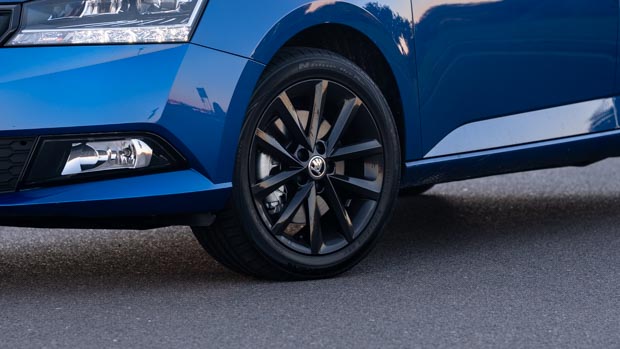
The light car combines some of the best features from the Fabia Monte Carlo with standard suspension and goodies like LED headlights, adaptive cruise control and 16-inch ‘Vigo’ alloy wheels from $21,990 driveaway.
Alongside the extra-practical Fabia station wagon that carries a $1,000 premium, the Fabia Run-Out Edition Hatch on test is optioned with the seven-speed dual-clutch automatic. At $24,990 driveaway, the Fabia competes pretty squarely with the Kia Rio GT-Line ($25,990 driveaway).
You’ll get the Fabia into tighter parking spots than you will in a Rio, though. This Czech motor is truly tiny at just 3,997mm long and 1,732mm wide. That makes for a nuggety little car that looks great with the contrasting black roof. Our pick of colour would be Corrida Red, but the Fabia wears Race Blue ($550) well.
The Fabia’s diminutive size makes it easy to thread down narrow inner-city lanes with precision. It also fits into just about any parking space you can find and the lack of front parking sensors isn’t too much of a bother.
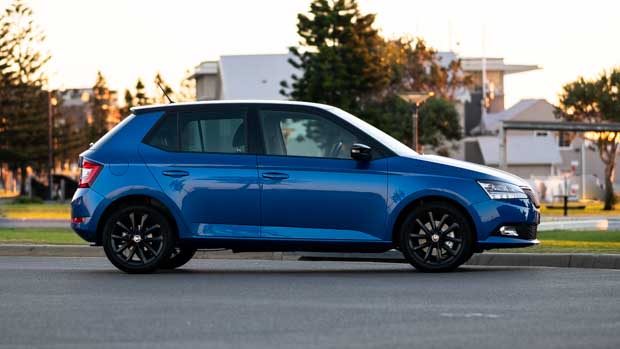
Ride quality in town is superb, the Fabia dances lightly on its feet thanks to its featherweight 1,097kg mass. It might be light but is well-damped and has generous wheel travel to soak up nasty bumps. The aging PQ platform does leave a little to be desired in NVH terms, with a resonant boom entering the cabin when the torsion beam rear suspension strikes bigger bumps. However, the same is true of most of this car’s rivals.
Suspension noise is more pronounced on faster, pockmarked backroads and, although not a deal breaker, shows the age of the Fabia when compared to the more refined Volkswagen Polo that runs on the same MQB-A0 platform that the incoming 2022 Fabia will adopt. At least the Fabia makes up for the excess noise by being plenty of fun to drive in the country.
In a show of just how deep the Volkswagen Group’s combustion engineering runs, even though the 81TSI 1.0-litre three-cylinder turbo petrol engine is a generation behind Skoda’s newer motors, it doesn’t feel that way in isolation. The 81kW power figure is adequate, but the 200Nm of torque between 2,000-3,500rpm gives the Fabia a muscular flexibility that naturally aspirated rivals from Kia and Mazda simply cannot match.
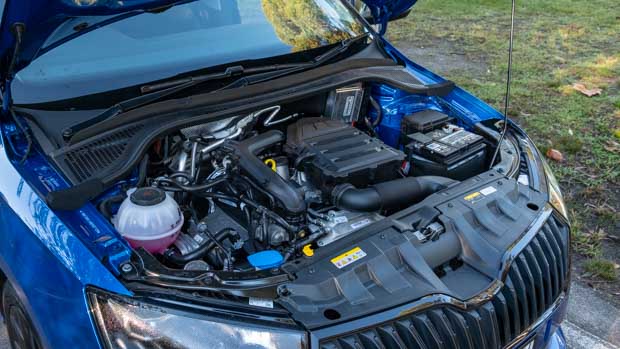
The broad torque spread means the Fabia is as happy at 110km/h as it is at 60km/h. Cruising up the notoriously hilly M1 motorway from Sydney to Newcastle was easy, the only occasional disturbance came from some strong crosswinds but you never feel like a pigeon caught in a jet-stream.
A special mention is required for Skoda’s adaptive cruise control. Despite the Fabia’s age, the system is one of the best in class. When engaged it holds a consistent distance and doesn’t over-react to cars pulling out. If the stalk-mounted controls weren’t so confounding to use it would be even closer to perfection.
Turning off the freeway onto some testing country tarmac and the Fabia is even happier. The steering may feel very digital, but the accurate ratio and light weighting means the Skoda is surprisingly satisfying to place. The grip level is communicated through the seat of the pants rather than the wheel.
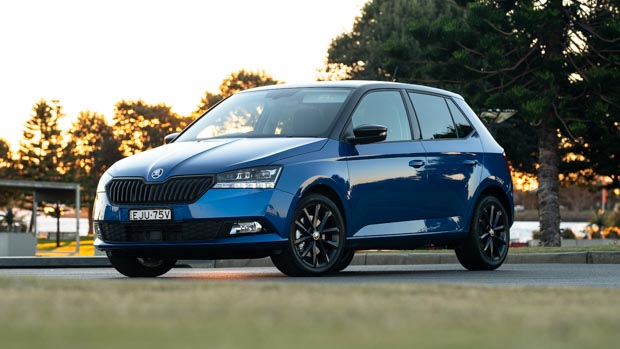
Sure, this isn’t a hot RS variant – though hopefully Skoda develops a new Fabia RS to rival the Polo GTI – but it’s a tremendously fun little car. The torsion beam rear suspension is not the most sophisticated but the Fabia’s light weight means that complication is not necessary.
Outright grip is reduced by the cheap Nexen N Blue Eco tyres, but the Fabia made the most of them with its neutral balance. It’s a cleverly engineered hatch with well-tuned suspension that slightly preferences comfort over outright control. In short, the Fabia is great to drive.
That said, the Fabia’s age means it doesn’t have the same full complement of safety features of dearer and newer rivals like the Toyota Yaris. The Fabia did receive five stars from ANCAP in 2015, but it misses out on forwards cyclist and reversing AEB functionality.
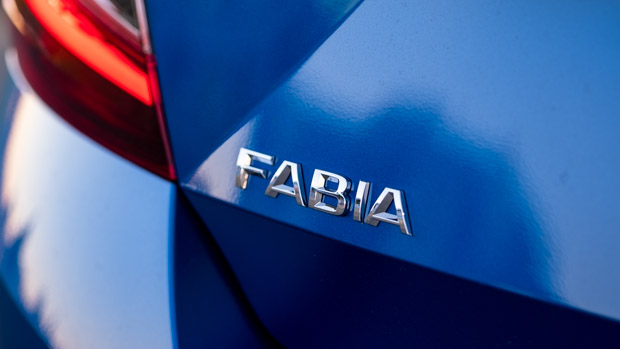
That said, standard safety tech is still decent. The Fabia Run-out Edition features forward vehicle-sensing AEB, rear cross-traffic alert, rear parking sensors, a reverse camera and blind-spot monitoring.
Like the driving dynamics, the Fabia’s age has made the light car’s cabin a mixed bag. The basic design and build quality is great, though the age factor means missing out on some contemporary niceties buyers have come to expect, even from the most affordable vehicles.
Starting with the practicalities – the pair of cup holders that sit ahead of the shifter are tiny. The larger one can fit a small coffee cup and the smaller appears to be simply for decoration. The tray where you end up leaving your phone that’s plugged in for wired phone mirroring is similarly impractical, like it was designed for an iPhone 4, not an iPhone 12… which it probably was.
However, the door bins are very generous for the class with ample space for a one-litre bottle. The adjustable armrest has hidden storage big enough for a smartphone. Skoda specialise in surprise-and-delight practicalities and the Fabia delivers with features like a garbage bin for the driver and umbrella under the passenger’s seat.
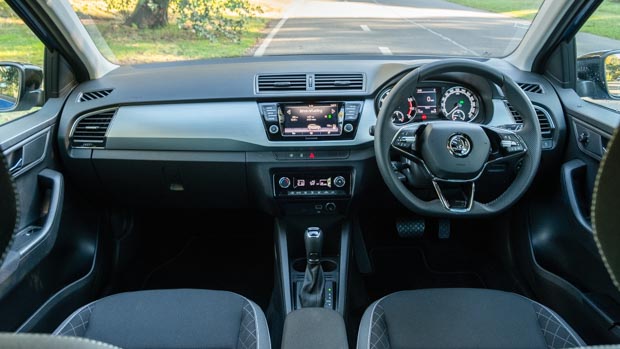
The analogue dials are easy to read, though the 4.2-inch TFT screen looks decidedly low resolution. The same can’t be said for the touchscreen which still presents smartly running Apple CarPlay or Android Auto, though Skoda’s own software looks ancient and, at 6.5-inches in size, the screen is on the small side.
The manually-adjustable seats are cloth-appointed and offer infinite backrest adjustment which is much better than the stepped ratchet adjusters you get on most rivals. The front seats are generally comfortable and well bolstered, though on longer journeys the flat base caused leg fatigue to seep in.
Where the Fabia really impresses are the high-traffic touch points. That leather-appointed steering wheel looks and feels really premium. The cabin feels screwed together solidly, though there are lots of scratchy plastic finishes on the dash and doors. But, that’s to be expected at this price.
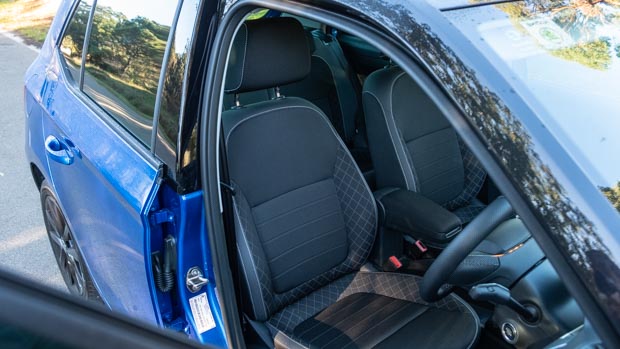
Really the Fabia is designed with front seat passengers in mind. At six-foot-two I struggled to fit my knees in behind my driving position. However, those less than five-foot-ten should be more comfortable. Head and toe room is ample for those of any height.
Skoda has outfitted the Fabia with two USB ports for rear passengers which is nice, though there are no rear air vents, nor is a rear armrest available.
There is a further nod to Skoda’s ‘Simply Clever’ mantra when it comes to the boot space, which is substantial despite the Fabia’s tight dimensions. Neat touches like having two heights for the parcel shelf makes the 330L of cargo space far more usable for runs to the shops.
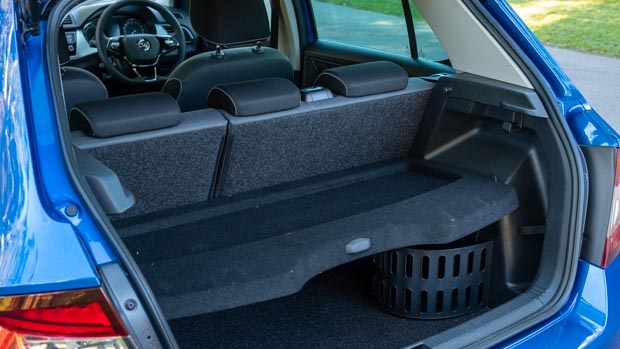
With the rear seats folded it is just possible to fit a large size bicycle in the Fabia with the wheels removed. There is also a neat plastic cargo arranger to stop fragile items sliding too far around the boot. Skoda has also fitted some plastic pockets off to the left side, good bag hooks and a cargo net to finish the Fabia off.
As with the driving experience, it’s impressive how the simple but clever engineering has held up over time. While some competitors like the Toyota Yaris have moved to hybrid powertrains, Skoda are sticking to downsized turbo petrol engines.
The Fabia should return very impressive fuel economy – claimed combined consumption is 4.7L/100km. In our testing this figure settled at 5.5L/100km, the best number achieved on an 80km run was 5L/100km.
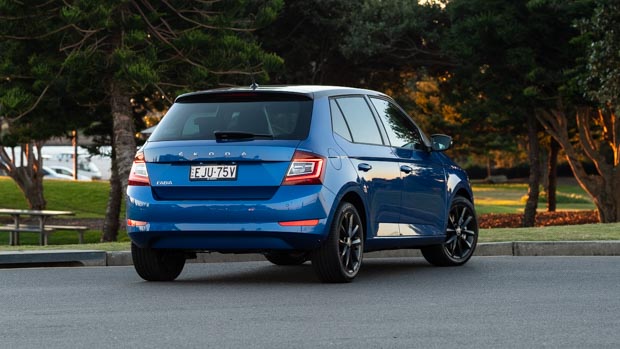
Truth be told, 110km/h freeways are not where the Fabia is most efficient, instead it’s on 80km/h highways where the Fabia sits around 4L/100km. The 81TSI engine needs to be run on premium 95 octane unleaded petrol at a minimum.
Servicing needs to be carried out every 15,000kms or 12 months which is about middling for this class. Skoda offers five years of capped-price servicing which totals $2,215.
The Fabia is covered by a five-year, unlimited-kilometre warranty in Australia that includes the same period of free roadside assistance.
The Skoda Fabia is up for replacement soon, so after all that, is it wise to pick up a deal this late in its life? Well the good news is that the fourth-gen Fabia is still worthy of consideration, especially if you can drive a manual – because at $21,990 driveaway the stick-shift Skoda is basically a steal.
As for whether the DSG automatic gearbox is worth an extra $3,000: that’s more difficult to quantify. Despite its age, the Fabia’s drivetrain package still feels more advanced than its rivals (save for the more expensive Polo) and returns stellar fuel economy.
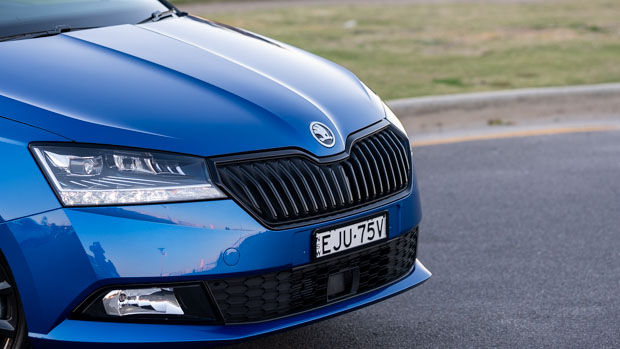
The cabin is where the Fabia is most obviously aging – a tiny 6.5-inch touchscreen and hard-touch plastics bring the perceived expense down.
But the Fabia hits back with clever practical touches and premium driving experience that make this little car endearing and enjoyable. This Fabia Run-out edition is a really complete package for the price and leaves us rather excited for the next instalment.
Variant tested 81 TSI RUN OUT EDITION
Key specs (as tested)
About Chasing cars
Chasing Cars reviews are 100% independent.
Because we are powered by Budget Direct Insurance, we don’t receive advertising or sales revenue from car manufacturers.
We’re truly independent – giving you Australia’s best car reviews.
The estimate provided does not take into account your personal circumstances but is intended to give a general indication of the cost of insurance, in order to obtain a complete quote, please visit www.budgetdirect.com.au. Estimate includes 15%^ online discount.
^Conditions Apply
Budget Direct Insurance arranged by Auto & General Services Pty Ltd ACN 003 617 909(AGS) AFSL 241 411, for and on behalf of the insurer, Auto & General Insurance Company Limited(ABN 42 111 586 353, AFSL 285 571).Because we don’t know your financial needs, we can’t advise you if this insurance will suit you. You should consider your needs and the Product Disclosure Statement before making a decision to buy insurance. Terms and conditions apply.
Indicative quote based on assumptions including postcode , 40 year old male with no offences, licence suspensions or claims in the last 5 years, a NCD Rating 1 and no younger drivers listed. White car, driven up to 10,000kms a year, unfinanced, with no modifications, factory options and/or non-standard accessories, private use only and garaged at night.
^Online Discounts Terms & Conditions
1. Discounts apply to the premium paid for a new Budget Direct Gold Comprehensive Car Insurance, Third Party Property Only or Third Party Property, Fire & Theft Insurance policy initiated online on or after 29 March 2017. Discounts do not apply to optional Roadside Assistance.
2. Discounts do not apply to any renewal offer of insurance.
3. Discounts only apply to the insurance portion of the premium. Discounts are applied before government charges, taxes, levies and fees, including instalment processing fees (as applicable). The full extent of discounts may therefore be impacted.
4. We reserve the right to change the offer without notice.